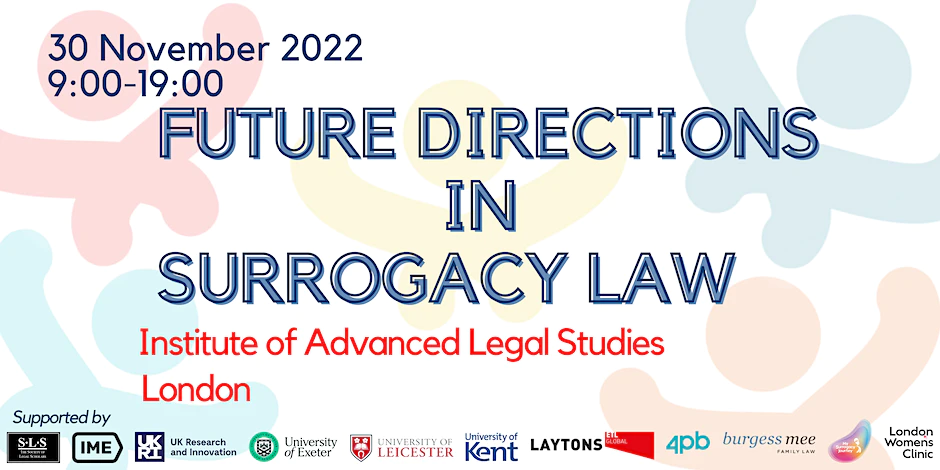Natalie was delighted to speak at the Future Directions in Surrogacy Law conference at the Institute of Advanced Legal Studies in London on 30 November.
What was the Future Directions in Surrogacy Law conference about?
The conference was organised by Dr Kirsty Horsey, Dr Katharine Wade and Zaina Mahmood, with a full programme of panels discussing surrogacy law and practice both in the UK and overseas, including:
- Professor Nick Hopkins and Gillian Black from the Law Commissions of England and Wales and Scotland
- Mrs Justice Theis, lead surrogacy judge in the High Court Family Division
- Professor Susan Golombok, Cambridge University
- A ‘lived experience’ panel of parents and surrogates
- A young person’s panel comprised of young people who were either born through surrogacy or the children of surrogates (for many of us, the highlight of the conference).
Talking about the challenges of international surrogacy
Natalie spoke as part of the panel on International Issues in Surrogacy, addressing the conference about the reasons UK parents go overseas for surrogacy and the implications for law reform.
She looked at the growth of international surrogacy since the UK’s first international case in 2008, with international surrogacy now outstripping domestic surrogacy: statistics from the English family court reveal an average of 167 parental order applications made following international surrogacy arrangements each year (2017-21), compared with only 138 domestic UK surrogacy cases. Breaking down those international surrogacy cases by destination, 41% have involved US surrogacy arrangements, 16% Ukraine, 6% Canada, and the remainder a wide range of other countries. This shows that most UK parents choose ‘destination’ countries (like the US, Ukraine and Canada) in which there is established law supporting surrogacy, rather than countries in which surrogacy is unregulated.
Natalie also spoke about the research carried out by Brilliant Beginnings and Cambridge University in 2018 which showed that the biggest reasons motivating UK parents to go overseas for surrogacy were then the lack of professional matching services in the UK, the lack of legal certainty in the UK, and the shortage of UK surrogates. That suggests that the current UK legal framework is a significant driver of international surrogacy, creating an opportunity for law reform to change the dynamic significantly. However, at the same time international surrogacy is well established, and law reform also needs to address the needs of children born through surrogacy abroad, enabling them too to be recognised as the legal children of their UK parents from birth.
Natalie shared the panel with Dr Marianna Iliadou from the University of Sussex (who talked about the European Court of Human Rights’ approach to surrogacy), Dr Brian Tobin from Ireland (who discussed current law reform in Ireland) and Dr Debra Wilson from New Zealand (who discussed the law and how it has moved forward in New Zealand). All the talks highlighted that managing international surrogacy is a global challenge and the UK is not alone in having to grapple with its challenges.
The UK’s leading surrogacy lawyers
Find out more about how we support families through surrogacy



